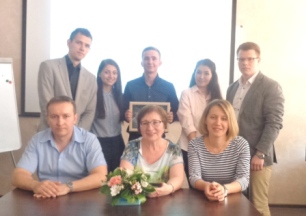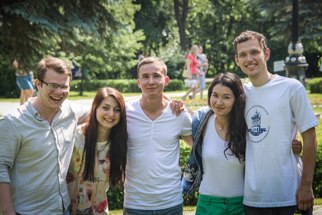First students majoring in social anthropology defended their qualification theses

The students’ bachelor theses clearly illustrated LSAR research lines that young researchers show special interest in. Their research was based on quite extensive fieldwork materials including direct communication with informants. For instance, for his thesis themed ‘The anthropological analysis of expert work specificities in the context of conflict in coal-mining areas of Western Siberia (the case of a social conflict over liquidation of the Shor village of Kazas’ (research adviser professor Dmitriy A. Funk), Sergey Artsemovich carried out field research in Kazas in Kemerovo region where he studied the issue of complex and multi-layered relationships of the state, industry and indigenous population in the region. The discussion of his work revealed the need for further reflection on and thought about the role of expert knowledge as such and about prospects of its use in decision-making in terms of economic and legal aspects of conflicts.
Seil Djanyzakova presented her research titled ‘Student migration from Kyrgyzstan to Russia; adaptation and identity of foreign students: the case of Tomsk’ (research adviser professor Irina Nam). It deals with such issues as the relationship between civil and ethnic identity of the Kyrgyz youth studying in Tomsk as well as with the forms of its symbolic representation and functioning in a different cultural and linguistic environment. It uncovers a sort of psychological peculiarity on part of the host society that sees people arriving from the post-Soviet territories as being not quite foreign citizens, the fact that accounts for comparatively lesser attention paid to the issues of their adaptation here.
This has proved to be largely the case for Kazakh citizens as well – the topic explored by Anton Sadyrin in his theses titled ‘Student migration from Kazakhstan to Russia: the case of Tomsk’ (research adviser professor Irina Nam). Direct communication with respondents allowed formulate one of the central research theses that the term ‘student migrant’ which has been around in social anthropology for long is completely irrelevant in terms of characterizing people coming to Tomsk from Kazakhstan. Instead, such categories as ‘repatriate’ or just ‘one of us’ sometimes prove to be more adequate.
 Ekaterina Lukyanova’s bachelor thesis dealt with a somewhat different research question looking into the Anyong Korean Youth Centre as a place for interaction of Korean young people in Tomsk (research adviser professor Irina Nam). The focus of her attention was mostly Tomsk residents of Korean descent who, in one way or another, are interested to learn about the life in their ‘historical’ homeland and its traditions and are involved – some more and some less – in the Centre’s activities. Evidence found by Ekaterina indicates that this organization is more of an open and cultural-educational than closed and diasporic nature.
Ekaterina Lukyanova’s bachelor thesis dealt with a somewhat different research question looking into the Anyong Korean Youth Centre as a place for interaction of Korean young people in Tomsk (research adviser professor Irina Nam). The focus of her attention was mostly Tomsk residents of Korean descent who, in one way or another, are interested to learn about the life in their ‘historical’ homeland and its traditions and are involved – some more and some less – in the Centre’s activities. Evidence found by Ekaterina indicates that this organization is more of an open and cultural-educational than closed and diasporic nature.
Last but not least, Fyodor Smetanin’ work titled ‘The destruction and revival of the Muslim community in Tomsk in the 20th to the early 21st centuries’ discussed different aspects of the history of the Tomsk Muslim community’s spiritual life and Muslims’ social bonds at different levels: the congregation of the White and the Red Mosques, their relationships with the clergy, the relationship between Muslims and followers of other religions as well as between ethnic and religious identity within the Muslim community itself. All of this is becoming ever more relevant in our days.
Despite students’ anxiety about the defense, it went in a friendly, thought-provoking atmosphere stimulating further research. All the presented theses were highly assessed by the Board and passed with honours. Also, it was recommended that they should be submitted to the contest of the students’ best qualification theses. On their part, young researchers unanimously and wholeheartedly thanked their research advisers and the faculty and expressed special gratitude to the LSAR team for help and support which they always had on the way to their achievements. Many remembered Eleonora L. Lvova who was one of those who had laid the foundations of social anthropology at TSU.
At the end, the Board members addressed the newly-graduated bachelors with a parting piece of advice calling on them to not only develop their theoretical knowledge and professional skills but also cultivate their sense of civil responsibility toward the society and the state. Often, anthropologists have to work in conflict situations finding themselves at the crossroads of differing economic, social and political interests, of diverse national, cultural and religious sentiments. So may their service be useful for the development of national and international science as well as for the balanced development of the country as a whole.
We congratulate our young colleagues on the defense and look forward to seeing them in our master programme!





 The project "Man in a Changing World. Identity and Social Adaptation: Past and Present" is funded by the Russian Government
The project "Man in a Changing World. Identity and Social Adaptation: Past and Present" is funded by the Russian Government 